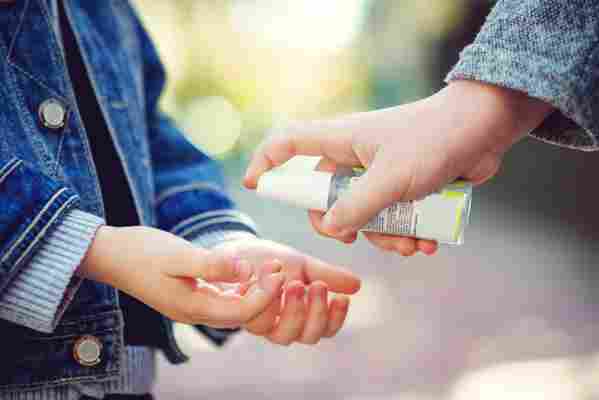
School is almost out and many families are planning summer plans and potential vacations after a year spent primarily inside. As more and more people try to reclaim a sense of “normalcy” in a post-vaccine world, many parents might be wondering if it’s safe for unvaccinated children to play together, hop on planes, and hug family and friends.
As of publish time, nearly half of the United States population has received at least one dose of a COVID-19 vaccine, and children between the ages of 12 and 17 are now eligible to receive the Pfizer vaccine, the New York Times explains. But just because children are able to receive the vaccine doesn’t mean they’ll be automatically immunized: School and work schedules, as well as vaccine availability might hinder the rollout toward a fully-vaccinated family.
If your family falls into this category, you might wonder what to do in the interim — especially as mask mandates are being relaxed nationwide. Here are six things experts want you to remain aware of if you’re vaccinated, but your kids aren’t yet.
What should parents generally know about the vaccine?
There is so much information regarding vaccines, it might be overwhelming to try to take in on your own, and it’s only natural that parents may have questions. One of the primary concerns might be whether the vaccine is safe.
“It’s important for parents to remember that clinical trials have been going on for months with children in the 12-15-year-old age group, showing the vaccine is safe and effective,” Dr. Wassim Ballan, a pediatric infectious diseases physician at Phoenix Children’s Hospital, tells Apartment Therapy. “Pfizer’s COVID-19 vaccine was found to be 100 percent effective in preventing COVID-19 in children in this age group.”
He adds that the clinical trials involved thousands of people and have proven that Pfizer’s COVID-19 vaccine is safe and effective in children 12 and over.
Should unvaccinated children continue to wear masks?
It appears masking guidelines change every day. The CDC now says fully vaccinated individuals aren’t required to wear a mask indoors or outdoors. Yet, there is no way to verify whether adults are vaccinated, and many private businesses may still require masks.
So, what’s the final word? Should unvaccinated kids continue to wear a mask?
The short answer is yes.
“The recent CDC guidance on masks no longer being required in many instances is exclusive to fully vaccinated individuals,” Dr. Mona Amin, a board certified pediatrician, mother, and the owner of PedsDocTalk, tells Apartment Therapy. In other words: The new guidance doesn’t apply to children who are unvaccinated — and while generally children are at lower risk of severe COVID-19 complications, the virus could still be fatal, especially for immunocompromised children. Moreover, children can still spread the virus to other people, and masks help deter that spread.
Parents can certainly help their children feel less alone if they have to wear the mask. “Parents who are fully vaccinated might find that by continuing to wear a mask in public or crowded places, their children who are not yet vaccinated are more comfortable or compliant with mask wearing as well,” Dr. Amin suggests. Chances are good you will still have to wear a mask to enter many businesses, so wearing it all the time in a show of solidarity with your young ones wouldn’t be too much of a stretch.
Should parents limit unvaccinated kids’ gatherings?
Almost everyone is eager to see family and friends during the summer. Some might choose to gather together, but are these outings safe for unvaccinated kids?
“I would limit gatherings to those in my circle — those that I know the vaccination status of the parents,” says Amin. “Otherwise, the risk is there, especially if the gathering is indoors.” The New York Times recently talked to 828 experts regarding the risk of COVID-19 for unvaccinated children in indoor and outdoor places, and the overwhelming majority agree that it’s better to keep your events and playdates outdoors whenever possible.
What is the current risk of COVID for kids?
Early on it appeared that generally, children who contracted the coronavirus were less impacted than adults even at the height of the virus. That doesn’t hold true for everyone, however, and Dr. Ballan notes that since the beginning of the pandemic, there have been more than 14,000 pediatric hospitalizations due to COVID-19 and more than 300 pediatric deaths attributed to COVID-19.
“While it’s true that generally, children tend to experience milder COVID-19 symptoms than adults, some children in the U.S. — especially those with underlying health conditions — have experienced serious complications and hospitalizations due to COVID-19,” he says. For that reason, achieving herd immunity is paramount. “To protect everyone in our homes and in our communities, it’s essential that everyone receive the COVID-19 vaccine when one is made available to them,” Dr. Ballan adds.
What is the advice for kids under 12?
While there are studies evaluating the Pfizer, Moderna , and Johnson & Johnson vaccines in young children starting at age six months, the Food and Drug Administration (FDA) has not yet approved any of them for widespread administration to children under the age of 12.
“Pfizer announced that we could see data in children ages six months to 11 years by the end of the summer, and we are optimistic that even more vaccines will be made available soon to a wider population,” Dr. Ballan notes. Kids under 12 should continue to wear masks, practice social distancing, and wash their hands.
I’m fully vaccinated, but my kids aren’t. Can I safely take off my mask?
While you’ve likely gotten used to wearing your mask, it can still be uncomfortable for certain activities, such as running outside, or generally when it’s hot out. But as Dr. Amin explains, removing your mask “depends on the level of risk you’re comfortable with.”
“Going maskless is great for vaccinated adults. But what about establishments that remove mask requirements for all patrons without checking vaccination status?” she asks. “What about the parents who have to take their unvaccinated kids to the grocery store? What about parents who have been relying on masking in indoor establishments to reduce risk for their children?”
The bottom line is that parents need to determine how high the risk is for their children. Immunocompromised children may need masks indoors and outdoors, while other children may be able to be maskless in limited situations. Safety comes first and it is likely a good idea for unvaccinated children to wear masks, wash hands, and practice social distancing.









